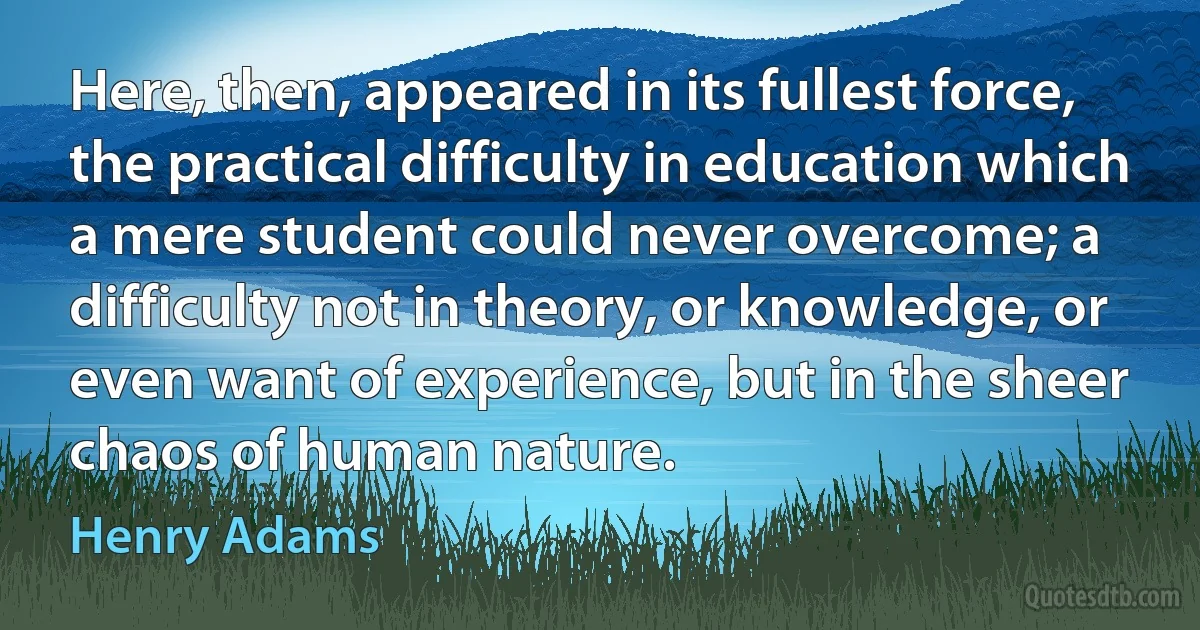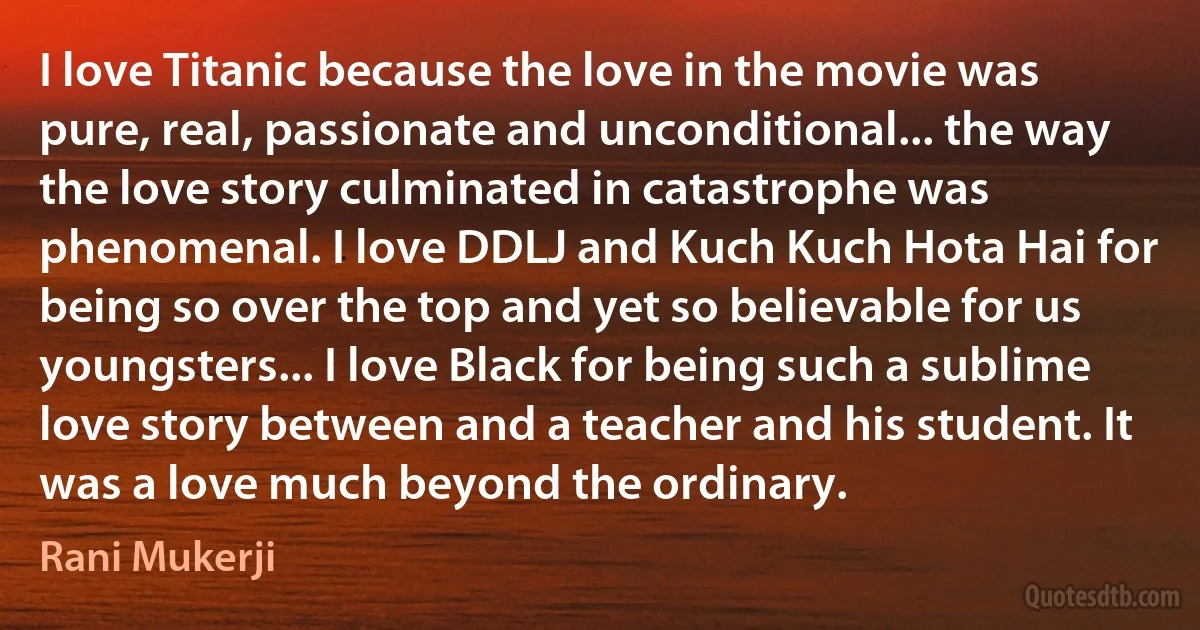Student Quotes - page 14
There are two levels of knowing a subject. There is the student who knows what the definition of a noun or a gene or a molecule is; then there is the student... who also knows how the definition was arrived at. There is the student who can answer a question; then there is the student who also knows what are the biases of the question. There is the student who can give you the facts; then there is the student who also knows what is meant by a fact. I am maintaining that, in all cases, it is the latter who has a "basic" education; the former, a frivolous one.

Neil Postman
I find it amazing now that my first economics class, taught by Alan Sweezy, used John Maynard Keynes's General Theory of Income and Employment as the textbook. Although this book is one of the most influential works of the twentieth century, it makes a really lousy textbook. Moreover, since I now regard Keynes's analysis as seriously flawed, it is surprising that I enjoyed the course so much. As a student, I appreciated the simple way that the Keynesian model explained the workings and failings of the overall economy. Especially appealing were the clever policy remedies, such as increased government spending and tax cuts, that Keynes recommended to combat unemployment. Too bad that I discovered later that the model was theoretically and empirically deficient!

Robert Barro
When I was a student in the 1950s, I read Husserl, Sartre, Merleau-Ponty. When you feel an overwhelming influence, you try to open a window. Paradoxically enough, Heidegger is not very difficult for a Frenchman to understand. When every word is an enigma, you are in a not-too-bad position to understand Heidegger. Being and Time is difficult, but the more recent works are clearer. Nietzsche was a revelation to me. I felt that there was someone quite different from what I had been taught. I read him with a great passion and broke with my life, left my job in the asylum, left France: I had the feeling I had been trapped. Through Nietzsche, I had become a stranger to all that.

Michel Foucault
I was a student at Berkeley in the late Reagan years. We had a lot of ideas back then, big dreams about getting famous and destroying the "Beigeocracy" that we thought stifled and controlled American Letters. Everything seemed possible then: world war, literary fame ... Anyway, something Really Big, with us at the center of it all.

Mark Ames
If the student got little from his mates, he got little more from his masters. The four years passed at college were, for his purposes, wasted. Harvard College was a good school, but at bottom what the boy disliked most was any school at all. He did not want to be one in a hundred - one per cent of an education. He regarded himself as the only person for whom his education had value, and he wanted the whole of it.

Henry Adams
This education startled even a man who had dabbled in fifty educations all over the world; for, if he were obliged to insist on a Universe, he seemed driven to the Church. Modern science guaranteed no unity. The student seemed to feel himself, like all his predecessors, caught, trapped, meshed in this eternal drag-net of religion.
In practice the student escapes this dilemma in two ways: the first is that of ignoring it, as one escapes most dilemmas; the second is that the Church rejects pantheism as worse than atheism, and will have nothing to do with the pantheist at any price.

Henry Adams
American literature offers scarcely one working model for high education. The student must go back, beyond Jean Jacques, to Benjamin Franklin, to find a model even of self-teaching. Except in the abandoned sphere of the dead languages, no one has discussed what part of education has, in his personal experience, turned out to be useful, and what not. This volume attempts to discuss it.

Henry Adams
The only privilege a student had that was worth his claiming, was that of talking to the professor, and the professor was bound to encourage it. His only difficulty on that side was to get them to talk at all. He had to devise schemes to find what they were thinking about, and induce them to risk criticism from their fellows. Any large body of students stifles the student. No man can instruct more than half-a-dozen students at once. The whole problem of education is one of its cost in money.

Henry Adams
...he took his lesson of political morality as learned, his notice to quit as duly served, and supposed his education to be finished.Everyone thought so, and the whole City was in a turmoil. Any intelligent education ought to end when it is complete. One would then feel fewer hesitations and would handle a surer world. The old-fashioned logical drama required unity and sense; the actual drama is a pointless puzzle, without even an intrigue. When the curtain fell on Gladstone's speech, any student had the right to suppose the drama ended; none could have affirmed that it was about to begin; that one's painful lesson was thrown away.

Henry Adams
Milk, barley, wheat, cereals, butter, cheese, tomatoes, honey, dates, fruits, almonds, and sugar-candy are all Sattvic food-stuffs. They render the mind pure and calm and play a very important part in the practices of spiritual aspirants, in the mental development of the student, and in the personality- power of the leaders of mankind.

Swami Sivananda
The light of the guru's grace helps us to see and remove the obstacles in our path. An ashram is not a mere cluster of inanimate buildings, temples and trees; rather it is the very embodiment of the sadguru's grace. It is a vital, dynamic and living institution that stimulates the aspiration of the sincere student to attain the state of oneness.

Mata Amritanandamayi
In schools, for example, there are courses in the criticism of literature, art criticism, and so forth. The arts are supposed to be 'not real.' It is quite safe, therefore, to criticize them in that regard -- to see how a story or a painting is constructed, or more importantly, to critically analyze the structure of ideas, themes, or beliefs that appear, say, in the poem or work of fiction. When children are taught science, there is no criticism allowed. They are told, 'This is how things are.' Science's reasons are given as the only true statements about reality, with which no student is expected to quarrel. Any strong intellectual explorations or counter versions of reality have appeared in science fiction, for example. Here scientists, many being science-fiction buffs, can channel their own intellectual questioning into a safe form. 'This is, after all, merely imaginative and not to be taken seriously.'

Robert Butts
I wanted to kill myself. I would have done it, too, if I had owned a gun. I was considering the gruesome alternatives - pills, slitting my wrists with a razor blade, jumping off a bridge - when another student called to ask me a detailed question on relativity. There was no way, after fifteen minutes of thinking about Mr. Einstein, that suicide was still a viable option. Divorce, certainly. Celibacy, highly likely. But death was out of the question. I could never have prematurely terminated my love affair with physics.

Arthur C. Clarke
There is no author to whom my father thought himself more indebted for his own mental culture, than Plato, or whom he more frequently recommended to young student. I can bear similar testimony in regard to myself. The Socratic method, of which the Platonic dialogues are the chief example, is unsurpassed as a discipline for correcting the errors, and clearing up the confusions incident to the intellectus sibi permissus.

John Stuart Mill
In every field there is a need for writing where the main objective is to extend the reader's field of acquaintance with the complex cases of the real world. Such writing does not have to be very exact or quantitative; it does not even have to formulate or to demonstrate hypotheses. It constitutes, as it were, travel over the field of study. Travel is certainly not enough, even for a geographer, but we would feel, I imagine, that a geographer who had never travelled would be under a serious handicap. Similarly the student of organizations who has never, even vicariously through reading, been in a hospital, a bank, a research laboratory, a large corporation, a Soviet factory, a revolution, an Egyptian civil service department, and so on, has missed something. His generalizations are apt to be based on too narrow a selection of the field.

Kenneth Boulding



